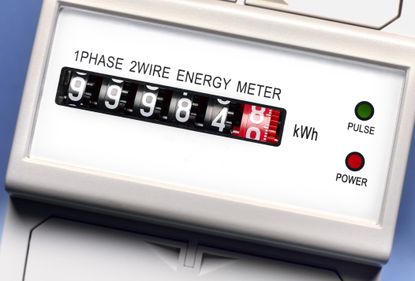Energy meter reading day: there's still time to submit your reading and avoid getting overcharged
URGENT: If you took gas and electricity meter readings before 1 October – but haven’t sent them to your supplier – don’t panic as there’s still time to do it


Households were advised to take their energy meter readings ahead of the new two year price cap guarantee, which came into effect on Saturday 1 October, to avoid being overcharged.
If you didn’t send in your meter reading before 1 October, the good news is there is still time to ensure your bill is not charged at a higher rate for usage before 1 October.
Under the new Energy Price Guarantee, bills from October will go up by around 27%, for the average typical user/
The £400 energy bill discount will be paid to most households in 6 monthly instalments from October, helping soften the initial impact of higher costs.
So, it made sense to take a meter reading before Saturday to ensure any energy used before 1 October is not charged based on the new price cap, but the old one.
Martin Lewis had suggested taking a meter reading before 1 October so there is “no estimate or discrepancy”. His advice was to take a picture of your meter reading as evidence and to take pressure off ‘meter reading day’ to submit your readings over the week to ensure you can get through to your energy provider.
Why do I need to take a meter reading?
The new price cap – the energy price guarantee – came in on 1 October across England, Scotland and Wales and if you are on your supplier’s standard tariff, it was worth taking meter readings to ensure you pay the ‘old’ cheaper rate for any energy used up until 1 October.
Look After My Bills Newsletter
Get the best money-saving tips, tricks and deals sent straight to your inbox every week. Make sense of your money in partnership with The Money Edit.
Gareth Kloet energy spokesperson from Go.Compare Energy says, “Until 1 October - energy costs per unit will still be in line with the previous Price Cap of £1,971, which is significantly lower than the £2,500 limit set to come in for October”.
“So taking a meter reading on 30 September, before the increases are due to come into force, will mean that your energy company cannot charge you at the higher rate for any units that have been used prior to 1 October”.
People have also taken to Twitter to spread the word about submitting your energy meter reading, as well as Ofgem.
🔔Energy prices change on 1 October 2022Keep your supplier up to date by supplying a meter readingIf you can't get through, you can submit your reading a reasonable time afterIt might help to take a photo of the reading pic.twitter.com/N7y8X1QaN8September 29, 2022
Please share this thread with anybody you think would benefit from the clarification that the energy price cap is not in fact… a cap… Also remember to take a meter reading and submit it to your energy supplier today or tomorrow to make sure your account is up to date! 🧵ENDSSeptember 29, 2022
Today is read-your-meter dayIn March, the average billpayer paid3p per kWh for gas, &19p for electricityFrom tomorrow, it will be10.3p for gas (+170%)34p for electricity (+70%)Make sure you get as much energy at the old priceRead your meter today & submit the readingSeptember 30, 2022
There was no fixed time to take your meter readings on 30 September and you could do it at a minute to midnight if you really wanted to – as this means any energy used before the new price cap kicked in should be billed at the current lower rate.
From 1 October onwards – any energy used will be billed at the new higher price cap.
WHICH ENERGY SUPPLIERS WILL STILL LET ME SUBMIT READINGS
Some energy suppliers are giving customers the whole of October to submit meter readings, so as long as you took a meter reading before 1 October.
According to the MoneySavingExpert website these energy companies will still backdate meter readings taken before 1 October.
British Gas – readings can be submitted until 14 October via its webform
E.on and E.on Next – readings can be submitted for five days after 1 October
EDF – readings can be submitted up until 7 October
Octopus – readings can be submitted up one week after 1 October
Shell Energy – customers can submit readings for up to 30 days from 30 September
Both SSE and Ovo Energy will also backdate readings – but you must submit these by phone – although no cut off time limit is given for this.
Worth checking with your supplier first – as some suppliers may need to you submit readings online, or as in the case of British Gas – via its webform - or want photo proof of your readings.
As well as taking meter readings Gareth Kloet says there are other things you can do to prepare yourself financially for the rise in energy costs.
“If you can afford to, try to increase your direct debit payments now and catch up on any arrears you may have with your energy provider. Also, if you are in a lucky position and have a balance in credit with your energy provider, try to keep it in the bank for your next bill increase”.
WHAT SHOULD I DO IF MY SUPPLIER'S WEBSITE CRASHES?
Last time round – ahead of the 1 April rise in the last energy price cap - energy firms faced criticism from consumer groups including CitIzens Advice when websites crashed as customers went online to send meter readings.
Customers reported issues logging in to supplier websites including British Gas, EDF, E.On, SSE, So Energy and Octopus Energy.
So, in some cases you can submit your readings up to 30 days later and your supplier will backdate the meter reading to 1 October.
Ideally take a snap of each meter reading on your phone – this way you have proof of the date the readings were taken. And you could also email it to yourself – which gives you a timestamp should you need to dispute your bill with your supplier down the line.
Some suppliers may allow you to email a photo as your meter reading, or ask you to enter the readings manually.
Who doesn't need to submit a meter reading?
Not everyone will need to submit a meter reading on or shortly after 30 September.
Households who don’t have to worry about sending meter readings on this date include those who are on a fixed-rate tariff or if you have a smart meter. In this case your meter readings are automatically sent to your supplier.
“If you have a smart meter, it may still be worth taking a photograph of your meter with the reading and your meter serial number visible, to provide to your supplier in case of any issues”, suggests Dr. Steve Buckley from Loop.
If you have a prepayment meter, you won't need to submit a meter reading either.
How to submit a meter reading
Most customers can submit readings by phone or online via their supplier’s website or app. Some companies even have online chat or text services.
If you are thinking of submitting over the phone, check its phone line opening hours.
The fastest way would usually be sending your reading online or through the app – however many suppliers’ websites and apps seemed unable to cope with the surge in demand last time round on 31 March with British Gas, EDF and E.On all experiencing website issues.
This is why many suppliers have now announced that they will accept backdated reading this time round.
If you really are struggling to submit readings – and gone beyond any time limit allowed by your supplier - send them in as soon as you can and explain when you tried to submit them and what the problem was.
HOW TO REDUCE ENERGY COSTS
Here are several ways you can cut energy costs to try and lessen bills this Winter.
Turn down the thermostat. Heating and hot water make up around half of a household’s energy usage. Turning the heat down by just one degree can save up to £80 a year on energy bills.
Wash clothes at a lower temperature. The washing machine is one of the most used household appliances. Lower temperatures use less energy: by washing your clothes at 30°C rather than 40°C, you’ll use 38% less energy, according to Which?.
Switch to microwave cooking. Using your microwave instead of your electric oven can save over £300 a year according to Utilita. And using a slow cooker for casseroles and stews can save nearly £260 a year compared with using the oven. Utilita and Iceland will also be offering free workshops on ways to save on energy bills as part of their combined ‘Shop Smart Cook Savvy’ campaign. The sessions will start from 10 October and be available as a free 45 minute live link and video as well as taking place in schools and community spaces.
Ditch the dryer. Tumble dryers cost around £40 per year to use, and that’s before the price hike. As the weather improves, using an outdoor clothesline or airer will cut down on energy usage and reduce your bills.
Turn off appliances. There are an average of 10 electrical items unnecessarily switched on in UK households at any one time according to the energy supplier Utilita. Turning your television set off at the mains can save you up to £16 of electricity a year.
Switch your lightbulbs. Changing to energy-saving lightbulbs can save households around £30 a year, according to Utilita. According to the firm, 30% of UK households have yet to make the switch. The bulbs cost as little as £1 each.

Sue Hayward is a personal finance and consumer journalist, broadcaster and author who regularly chats on TV and Radio on ways to get more power for your pound. Sue’s written for a wide range of publications including the Guardian, i Paper, Good Housekeeping, Lovemoney and My Weekly. Cats, cheese and travel are Sue’s passions away from her desk!
- Vaishali VaruStaff Writer
-
 Three energy firms pay £8m in switching compensation - has your provider paid out?
Three energy firms pay £8m in switching compensation - has your provider paid out?More than 100,000 customers have received compensation after changing providers, but is now a good time to switch energy suppliers?
By Tom Higgins Published
-
 Save £300 on your supermarket shop with cashback accounts
Save £300 on your supermarket shop with cashback accountsBanks, credit card companies and cashback sites are all offering cashback on your supermarket shop, but can you use them all to max out your savings?
By Vaishali Varu Published
-
 Three energy firms pay £8m in switching compensation - has your provider paid out?
Three energy firms pay £8m in switching compensation - has your provider paid out?More than 100,000 customers have received compensation after changing providers, but is now a good time to switch energy suppliers?
By Tom Higgins Published
-
 HMRC tax credit renewal packs: act quickly to avoid losing benefit payments
HMRC tax credit renewal packs: act quickly to avoid losing benefit paymentsHouseholds receiving tax credits will be asked to confirm their details to ensure they continue to receive their entitlement. Here’s everything you need to know to make sure you don’t miss out on up to £3,480 a year
By Tom Higgins Published
-
 Mobile provider rewards: how to earn up to £700
Mobile provider rewards: how to earn up to £700Your phone could be the key to unlocking hundreds of pounds worth of discounts and freebies that you don’t even know about. We reveal which mobile providers offer the best rewards
By Vaishali Varu Published
-
 How much do cooking appliances cost to run?
How much do cooking appliances cost to run?Energy-saving cooking tips from the Energy Saving Trust
By Katie Binns Published
-
 Virgin Media leaves thousands without broadband: are customers entitled to compensation?
Virgin Media leaves thousands without broadband: are customers entitled to compensation?Tens of thousands of Virgin Media customers were hit by broadband outages yesterday. We explain your rights if your broadband goes down
By Katie Binns Published
-
 Broadband switching service delayed - how it will eventually work and why it’s crucial to switch
Broadband switching service delayed - how it will eventually work and why it’s crucial to switchA broadband switching service designed to make it easier to change to a cheaper or faster deal has been delayed. We explain how you can still avoid huge increases to your monthly internet bill
By Katie Binns Published
-
 Heat pumps: why you can claim a £5,000 government grant for longer
Heat pumps: why you can claim a £5,000 government grant for longerWhy you now have more time to apply for a government grant towards getting a heat pump in your home
By Sue Hayward Published
-
 British Gas cuts energy bills by £15 for prepayment meter customers from April
British Gas cuts energy bills by £15 for prepayment meter customers from AprilOne million British Gas customers on energy prepayment meters will save around £15 as British Gas cuts its penalty three months early
By Sue Hayward Published